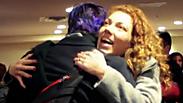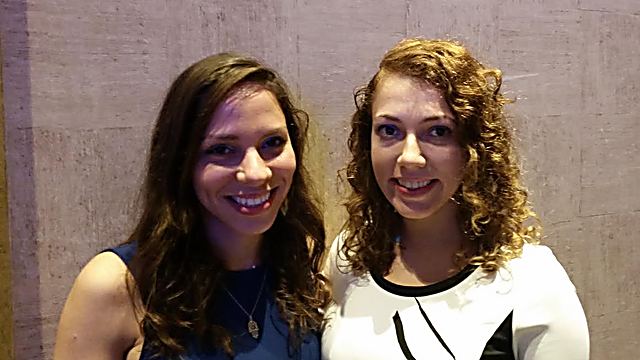
Living in English, dreaming in Russian, yearning in Hebrew
Former Soviet Jews living in Canada have an old-new dream: To live in Israel, or at least to raise their children there. But their convenient life in North America, alongside their fear of the security situation in Israel, are making them postpone their plans to an unknown date.
Many former Soviet Union (FSU) Jews living in Canada have a similar old-new dream too: To live in Israel, or at least to raise their children there. But the success they are enjoying in North America, alongside their fear of the security situation in Israel, are making them postpone their plans to an unknown date, probably after Boaz graduates from college.
The city of Toronto recently hosted the Limmud FSU conference, which attracted hundreds of local young Jews to a weekend of lectures and cultural, art and Jewish food events. As the organization's guest, I have already attended similar conferences in Russia and Ukraine, but the Canada conference was completely different.
The Marom sisters miss the homeland
It’s not just the location, but mainly the human composition. While Limmud conferences in Eastern Europe appeal to a local Jewish audience, which seeks to connect to its roots after many years of detachment in the shadow of Communism, the parallel Canadian population includes young and adult Jews who immigrated to Israel from the former Soviet Union and then emigrated to North America. And from there, they want to and event insist on staying connected to both the Jewish heritage and the Russian culture.

Hundreds of thousands of FSU Jews live in Toronto, making up one of the largest Jewish concentrations in the world. This year, the Limmud conference (which isn't cheap) recorded a rise in its number of participants to 450 people, who were closely cared for by several volunteers from the community.
Sisters Dalia and Liora Marom (23 and 22, respectively), speak Hebrew as a mother tongue. They are "Sabras" who were born to a father from Belarus and a mother from Moscow, who immigrated to the Holy Land in the major immigration of 1991.
In 2007, the family immigrated to Canada, and after a short adjustment period, they fell in love with the country where citizens may swear allegiance to the elderly Queen of England, but which has a particularly handsome young new prime minister who supports the legalization of marijuana.
Dalia says she plans on starting medicine studies soon, while Liora is studying law and economics. They constantly long for the homeland, but convenience exceeds everything.
Security situation keeps youngsters away
Dalia says with a wide smile that she used to envy her friends who began sending pictures from their military service. But she and her parents realized, she adds, that military service would hinder her chance to integrate into the labor market in Canada, and so the idea was taken off the agenda.
The offer to study in an Israeli university was also suspended once the knifing intifada began. "But it's important to me that the children I have will be raised and study in Hebrew," she says. "It's important to me that they will maintain the Jewish culture and religion and won't assimilate. That's one of the reasons we came to the Limmud conference."
As Dalia said the last sentence, Liora smiled mischievously, and while giving a fake cough into her sleeve, she whispered in English: "Hypocrite." The two sisters immediately burst into uproarious laughter, and Liora explained that her beloved sister was actually dating a man who believes in the Trinity.
"It's important to me to return to Israel in the future," says Liora, "although I see myself starting my career in Canada. But I would like to live in Israel for a few years so that the children know what it means to be an Israeli."
Mild signs of anti-Semitism
The Marom sisters, who live in the Thornhill neighborhood like many of Toronto's Jews, say they are witnessing growing hostility towards Israelis and Jews among Muslim immigrants In the educational institutions, and especially in the academia. They have even encountered personal insults and offensive graffiti more than once.
The signs of anti-Semitism are currently mild, and the local Jews are not afraid of walking around Toronto with a skullcap on their heads, in complete contradiction to the situation in the capitals of France and Belgium, for example.
Sandy Cahn, co-founder of Limmud FSU, said during the conference that the hundreds of Jewish participants in the Toronto event for the second consecutive year serve as decisive proof of a productive and significant discourse.
She says there are many Israeli Russians living in the Toronto community. "Our conference is a way of connecting Russian Jews and Israeli Jews," she notes. "Some of the lessons are specifically dedicated to this connection and to Israel, and creates a networking opportunity between Russian Jews and Israeli Jews. It's a unique opportunity for us to learn from one another."
The conference featured, on the one hand, candle lighting stands and prayer halls, and on the other hand, a jazz performance by Leonid Ptashka and singer Irina Rosenfeld. On the one hand, a discussion on Judaism hosted by former Prisoner of Zion Rabbi Yosef Mendelevitch, and on the other hand, a cultural lecture by Gidi Grinstein, founder of the Reut Institute.
Roman Kogan, executive director of Limmud FSU, says the entire conference was organized by the charity's volunteers who live in Toronto, according to their acquaintance with the population the event appealed to. "Our job," he explains, "is to help, but not to decide for them."










